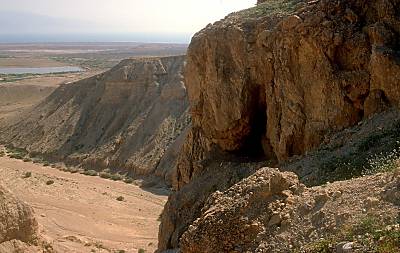사해사본이 발견된 쿰란의 동굴- 사진에 보이는 동굴 속에 항아리 안에 사해사본이 목동들에 의헤 발견되었습니다.
쿰란동굴이 있던 서쪽 산악지역...여기 저기 수 많은 동굴에서 여러가지 유물들이 발견되었던 산악에 동굴들
쿰란 공동체가 생활했던 발굴현장
쿰란에서 바라본 남쪽 사해바다와 주변 산악지역
Qumran Caves |
|
|
Cave 1 Allegedly discovered by a Bedouin shepherd chasing a stray, the initial Dead Sea Scrolls found here changed the study of the Old Testament. The seven scrolls were the Manual of Discipline, War of Sons of Light, Thanksgiving Scroll, Isaiah A and B, Genesis Apocryphon and Habakkuk Commentary. |
|
Cave 3 The Copper Scroll was found in this cave in 1952. This was the only scroll photographed in situ. The Copper Scroll is on display in the Amman Museum and lists 63 treasures hidden in the Judean wilderness and Jerusalem area. |
|
|
|
Cave 4 This most famous of the Dead Sea Scroll caves is also the most significant in terms of finds. More than 15,000 fragments from over 200 books were found in this cave, nearly all by Bedouin thieves. 122 biblical scrolls (or fragments) were found in this cave. From all 11 Qumran caves, every Old Testament book is represented except Esther. No New Testament books or fragments have been found. |
|
Cave 4 Interior The scrolls found in this cave were poorly preserved because they were not stored in jars. The practice of paying "per piece" led to the creation of multiple fragments from single pieces by the Bedouin thieves. This cave was among those looted by the Bedouin in the free afternoons of the days they were in the employ of the Qumran archaeologists. |
|
|
|
Cave 5 (foreground) This eroded cave was discovered by the archaeologists (Bedouin found caves 1, 2, 4, 6, 11). It is one of those in the marl terrace close to the site of Qumran (also caves 4, 7, 8, 9, 10). Archaeologists estimate that there were originally 30-40 caves in the marl terrace. |
|
Cave 6 This cave was not used for inhabitation, but only for the deposit of scrolls. This is the most accessible of the Dead Sea Scrolls to visitors today (follow the aqueduct from Qumran to the hills and it's on the left). |
|
|
|
Cave 7 (right), 8 (left) Everything found in Cave 7 was in Greek. The cave collapsed shortly after the scrolls were hidden. In Cave 8 were discovered 8QMezuzah, Genesis, and a hundred squares of small leather with strips. The guy who lived here had the job of making these strips. |
|
Cave 10 (right) Only one ostracon was found in Cave 10. Complete scrolls were found only in caves 1 and 11. In all 11 caves, some biblical books were found in large numbers: 34 copies of Psalms |
|
|
|
Cave 11 The last Dead Sea Scrolls found to date were found in this cave. Thirty scrolls were found including Leviticus and the Temple Scroll. The Temple Scroll was held by the antiquities dealer Kando until 1967 when being put in jail by Yadin, he agreed to sell it "of his own free will" for $110,000. |
'구약 성서 교실' 카테고리의 다른 글
| [스크랩] 홍해 (0) | 2010.06.14 |
|---|---|
| [스크랩] 얍복강 : 야곱이 밤새 천사와 씨름했던 곳, 브니엘, 숙곳 (0) | 2010.06.14 |
| [스크랩] 벧세메스 (0) | 2010.06.14 |
| [스크랩] 느보산 : 모세가 죽은 곳 (0) | 2010.06.14 |
| [스크랩] 브엘세바 (0) | 2010.06.14 |
























